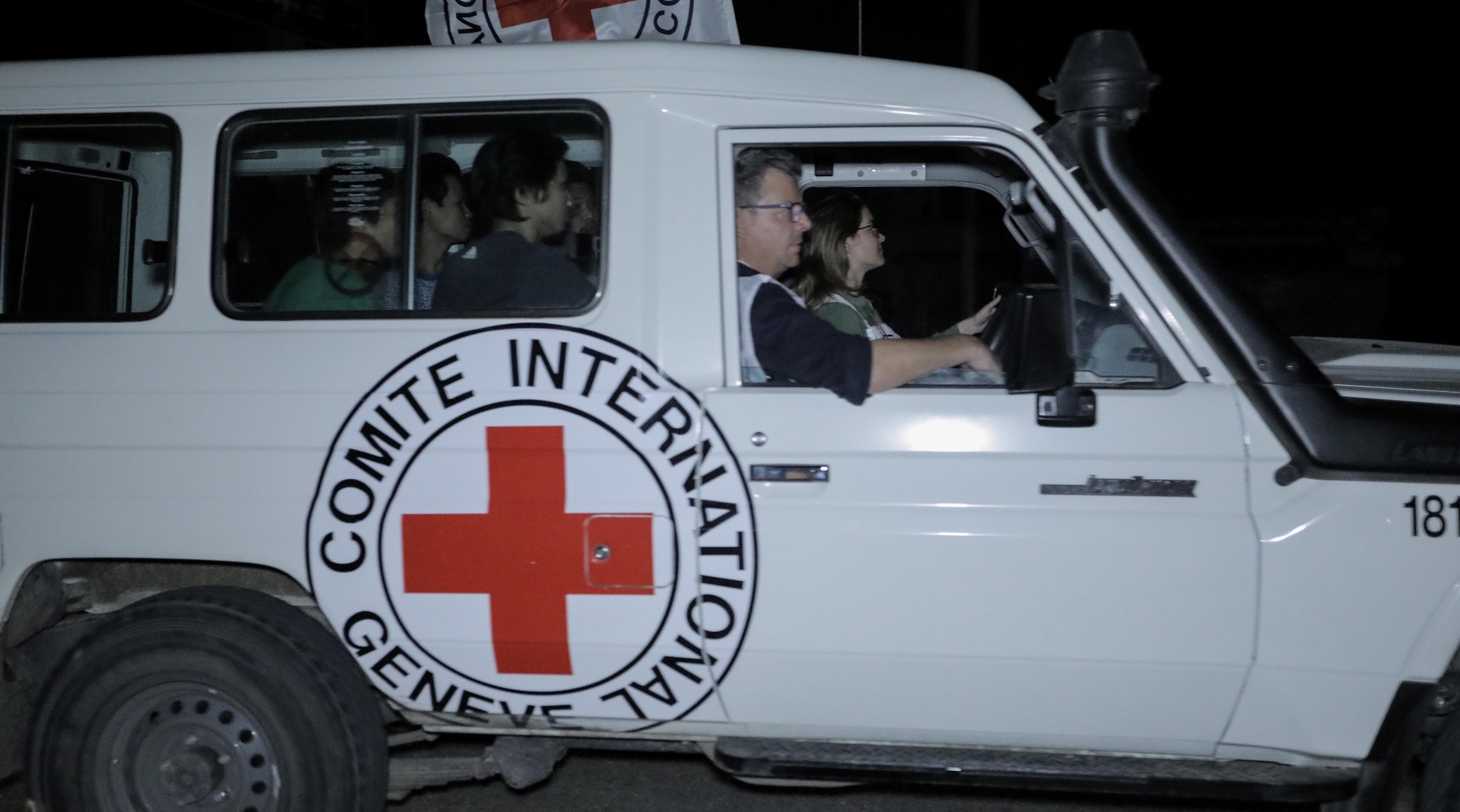After delays, Hamas releases another 13 Israeli hostages and 4 foreign nationals
Hamas scheduled the release for the afternoon and then delayed it. International intervention salvaged the deal

Hostages are transported in International Committee of the Red Cross vehicles from the Gaza Strip through the Rafah land crossing in Rafah, Gaza, Nov. 25, 2023. (Ahmad Hasaballah/Getty Images)
(JTA) — Hamas released another 13 hostages on Saturday after delays resulting from Israel and Hamas accusing each other of bad faith.
The total number of Israeli hostages released since Friday is now 26, more than half of the 50 women, children and elderly captives Hamas pledged to free. Hamas released the hostages in exchange a ceasefire that began on Friday and is slated to last at least four days. As part of the deal, Israel has also pledged to release a total of 150 Palestinian women and minors held in Israeli prison on security offenses.
In addition to the freed Israeli captives, Hamas has now released a total of 15 foreign hostages under a separate agreement brokered by the Thai government via Iran.
Hamas took approximately 240 people captive in its Oct. 7 attack on Israel, in which the terror group also killed 1,200 and wounded thousands. Hamas can extend the ceasefire by one day for every 10 additional hostages it releases, and may release a total of 80 under the current deal. Three Palestinian prisoners will be released for every Israeli hostage freed.
Israel has vowed to resume the war after the ceasefire, with the goal of eliminating Hamas. The Hamas-run Gaza Health Ministry says 12,000 people have been killed in the fighting, a number that includes combatants and civilians and doesn’t specify casualties from misfired Palestinian rockets.
The hostages released on Saturday night included eight children and five women. Israel was set to release 39 Palestinian prisoners.
Hamas scheduled the release for the afternoon and then delayed it, accusing Israel of delaying the delivery of humanitarian aid to Gaza, which was part of the deal, and of failing to release the longest-serving Palestinian prisoners. Israeli officials said the aid trucks had reached the Gaza Strip, but were delayed by roads devastated by weeks of Israeli strikes. Israel said there was no formal agreement to release the longest-serving prisoners first.
Last-minute interventions by the governments of Egypt, the United States and Qatar, which has acted as an intermediary for Hamas, salvaged the transfer. President Joe Biden made calls to Egyptian and Qatari leaders to ensure that the release occurred.
The Red Cross picked up the hostages around 11 p.m. on Saturday and crossed the border into Egypt just before a midnight deadline that would have triggered the end of the ceasefire. Israeli media and the families of the hostages identified some of those released as they watched video of them get out of ambulances in Egypt. They were transferred to Israeli territory within 30 minutes.
The 13 hostages, identified by Prime Minister Benjamin Netanyahu’s office, included some whose families have advocated in international media for their release. May are from Kibbutz Be’eri, one of the communities hardest hit by Hamas’ massacre. They are:
–Hila Rotem Shoshani, 12, and her friend, Emily Hand, 9, who were abducted from Kibbutz Be’eri. Hand is a dual Irish-Israeli citizen whose father, Tom, has written about her plight and called for her release on TV. Her mother died of breast cancer when she was a baby. Hila’s mother, Raya, remains in captivity.
–Shira Weiss, 53, and her daughter, Noga, 18, abducted from Be’eri. Ilan Weiss, Noga’s father and Shira’s husband, remains missing.
–Alma Or, 13, and her brother, Noam Or, 17, also abducted from Be’eri, where their mother, Yonat, was killed during the raid. Their father, Dror, remains in captivity.
–Maya Regev Jirbi, 21, who was injured in a Hamas raid on an outdoor party in which hundreds of young people were killed. Regev’s medical status was classified as “complicated” and Israeli TV reported that she would likely be transferred to a hospital by helicopter. Regev’s 19-year-old brother remains in captivity. She is the first abductee from the outdoor party to be released.
–Sharon Avigdor, 53, and her daughter, Noam, 12, who were visiting friends at Kibbutz Be’eri to celebrate the Simchat Torah holiday when the attack occurred.
–Adi Shoham, 38, and her children, Neve, 8, and Yael, 3, who were visiting family in Kibbutz Be’eri. Adi’s mother, Shoshan Haran, 67, a resident of the kibbutz, was also released. Adi and her daughters are dual German-Israeli citizens. Tal Shoham, their father and husband, remains in captivity.
Survivors of the attack on Be’eri crowded around TVs at a Dead Sea hotel where the Israeli government has housed them since Oct. 7. cheering when they recognized friends on the live feed from Egypt.
Upon the delivery of the hostages, Be’eri officials also accused Hamas of bad faith, noting that it had promised to keep families united and noting that Hila Rotem Shoshani’s mother remains captive.
This article originally appeared on JTA.org.





















